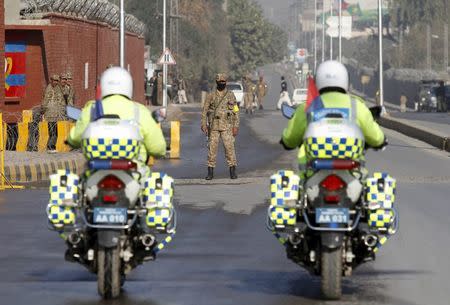Wave of arrests after Pakistan school massacre has unclear results

By Katharine Houreld ISLAMABAD (Reuters) - Pakistan has arrested nearly 100,000 people under a counter-terrorism programme enacted after a massacre of school children a year ago, though only about 2,000 of them were militants, a senior Interior Ministry official told Reuters. The rare figures on results of the National Action Plan (NAP) could reinforce critics who say it has resulted mostly in indiscriminate clamp downs that do not solve long-standing security problems. A solemn ceremony in the northwestern city of Peshawar commemorated the deaths of 134 children and 19 adults at a military school in a Pakistani Taliban assault, the deadliest militant attack in the country's history. In a speech in Peshawar on Wednesday, Prime Minister Nawaz Sharif barely mentioned the plan, instead focusing on the achievements of military offensives. "We formulated the National Action Plan," he said briefly, but spent most of his time praising military action along the Afghan border that "has broken the back of the terrorists. It has destroyed their hideouts, their training centres and their infrastructure". Pakistan announced the 20-point plan to tackle militancy after the assault on the Army Public School on Dec. 16, 2014. Among its main thrusts are expanded counter-terrorism raids, secret military courts, the resumption of hangings and promises to reform the justice system. Government officials say the plan is working, and no one disputes violence is down. Militant attacks killed an average of 90 people a month this year, down from 136 the previous year. However, several factors have contributed to the drop in violence: ongoing anti-Taliban military operations predating the plan and a continuing downward trend of attacks over the past few years. Many of those arrested under the National Action Plan have been civilians who say they must pay police to release them, like Afghan fruit seller Khaliq Khan in the northwestern town of Dera Ismail Khan. "I did not pay them, because I am legal and have a refugee card," he said. "I remained for 3 months in jail, my family is now afraid and thinking of running away from here." COURTS AND POLICE Statistics on arrests and prosecutions under the plan are rarely made public. In February, Interior Minister Chaudhry Nisar told parliament that 12,000 suspects had been picked up. However, Reuters on Tuesday viewed updated ministry figures showing that about 95,000 people have been arrested under the NAP. An ministry official, who spoke on condition of anonymity, confirmed the figure and said only about 2,000 of those were "hard-core" militant suspects and the rest were arrested for other, unspecified crimes. It was unclear how many of those arrested had faced trial and how many had been freed. Military spokesman Asim Bajwa said recently that 142 cases had been referred to special military courts, but other courts can also handle cases under the plan. Bajwa said military courts had seen "31 hardcore terrorists convicted". Little else is known about those on trial or the legal process, concerns sharpened after the government lifted a moratorium on executions. This year, 319 people were hanged, but the vast majority had no known militant connections, data collected by legal aid charity Reprieve showed. (Additional reporting by Saud Mehsud in Dera Ismail Khan and Asad Hashim in Islamabad; Editing by Robert Birsel)

